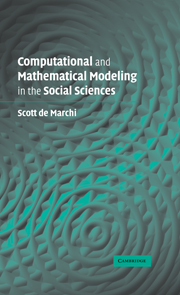Book contents
- Frontmatter
- Contents
- Acknowledgments
- Prelude
- 1 Not All Fun and Games: Challenges in Mathematical Modeling
- 2 Looking for Car Keys Without Any Street Lights
- 3 From Curses to Complexity: The Justification for Computational Modeling
- 4 Why Everything Should Look Like a Nail: Deriving Parsimonious Encodings for Complex Games
- 5 KKV Redux: Deriving and Testing Logical Implications
- 6 A Short Conclusion
- References
- Index
2 - Looking for Car Keys Without Any Street Lights
Published online by Cambridge University Press: 23 July 2009
- Frontmatter
- Contents
- Acknowledgments
- Prelude
- 1 Not All Fun and Games: Challenges in Mathematical Modeling
- 2 Looking for Car Keys Without Any Street Lights
- 3 From Curses to Complexity: The Justification for Computational Modeling
- 4 Why Everything Should Look Like a Nail: Deriving Parsimonious Encodings for Complex Games
- 5 KKV Redux: Deriving and Testing Logical Implications
- 6 A Short Conclusion
- References
- Index
Summary
INTRODUCTION
As we saw in the first chapter, there is a great deal of suspicion in the social sciences about purely empirical research. All too often, one finds models that fit a sample rather too well, demonstrating how modeling choices allow a researcher to discover relationships that are not genuine. Worse still, it is often unclear what is being tested in empirical work when there are ambiguities in the underlying deductive models. In this chapter, I will use the problems that complicate empirical work to highlight more general problems with both deductive and computational modeling. I will focus on empirical modeling initially, however, because these problems appear in a very clear form in empirical models. Moreover, empirical work is more common in the social sciences than either of the other traditions and thus deserves early attention. The goal, however, is not simply to criticize empirical work. Without it, no model stands on very firm ground, so this critique aims at the higher goal of generating a set of standards that would allow empirical work to be tied more closely to testing deductive and computational models. To demonstrate the main points I wish to make, I will draw more from the nonparametric and neural networks literatures than is common in social science. Additionally, research I have conducted with Christopher Gelpi and Jeffrey Grynaviski, and an ensuing debate with Nathaniel Beck, Gary King, and Langche Zheng will provide an example from an ongoing research question in security studies.
Information
- Type
- Chapter
- Information
- Publisher: Cambridge University PressPrint publication year: 2005
